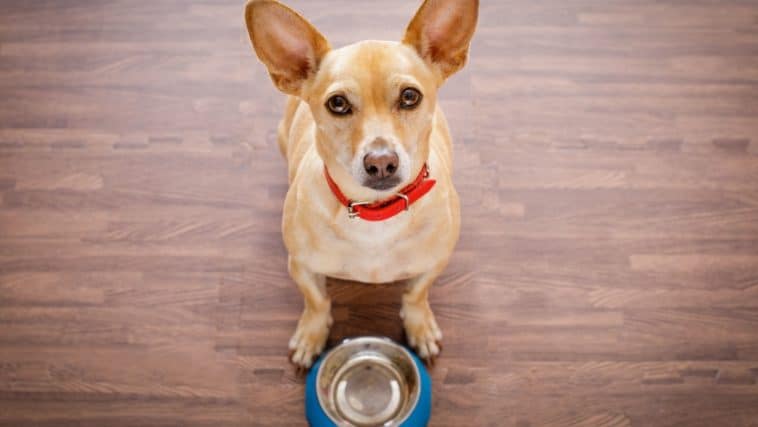Curry is a staple dish that is enjoyed by many families. It is fairly easy to make and there are different varieties to choose from.
As a dog owner, you will be accustomed to the longing gaze that they adopt when trying to convince you to give them some food from your plate.
Although their pleading looks can be difficult to resist, did you know that there are some foods that dogs should not be fed because they are made using ingredients that can be harmful to them? Curry is one of these dishes.
Below we have created a guide that covers this topic in more detail and also informs you of the steps that you should take if your dog should happen to eat it.
Table of Contents
What is curry?
First and foremost, it is important to have an understanding of what curry is and what ingredients it is made from. Curry is a name given to a variety of dishes that originate from India and have been made from a fusion of spices and herbs.
The most common spices that are added to a curry are cumin, ginger, ground coriander, turmeric, and chilies. As there is an array of curry recipes available, you will find that each has a slightly different taste.
Is curry safe for dogs?

Generally, curry and dogs are not a good combination. As we have mentioned, this dish is typically seasoned with an assortment of spices because this is what gives it flavor, however, a dog’s digestive system is not made to handle these spices.
Turmeric is a core ingredient in most curry recipes. It is believed to have an anti-inflammatory effect and can improve heart health and liver function. As such, this ingredient is safe for dogs when given in small quantities.
Cumin is another ingredient that is safe for dogs when given in small doses. Again, you must make sure that your dog is not fed too much of it because it can leave it with an upset stomach.
Found in the majority of curries, onion is toxic to dogs and should therefore be avoided at all costs. This ingredient contains disulfides and thiosulphates which are both toxic.
If ingested, they can lead to the development of health conditions such as hemolytic anemia or methemoglobinemia, both of which can result in the damage of red blood cells.
It is important to note that all parts of an onion can be harmful to dogs and this includes the flesh of the onion, the leaves, and the juice. All types of processed onion powders should also be avoided.
Most curries contain a lot of salt, sugar, and fat, and each of these things can be harmful to your dog.
Sugar is an unhealthy addition to a dog’s diet as it can increase blood sugar levels. As a result of this, your dog may begin to suffer from diabetes or obesity. Whilst small amounts of salt are safe for dogs, giving them too much can lead to a plethora of further issues.
This includes diarrhea, dehydration, and nausea. Although fat gives your dog nutrients too much can result in health issues and it can also cause obesity.
Whilst garlic is safe for humans to consume, the same cannot be said for dogs. The majority of curries use garlic but just like onion, it contains a lot of thiosulphates. As mentioned previously, this can lead to hemolytic anemia and damaged red blood cells.
Aside from these spices, a curry can contain a combination of many other ingredients and they can overwhelm your dog’s system.
If you enjoy eating milder curries, you may choose to feed your dog a very small amount, however, it is recommended that you stick to foods that are intended for canine consumption.
If you end up giving your dog food that is intended for humans, you should make sure that it is plain and uses simple ingredients.
What should you do if your dog eats curry?
If your dog eats anything without your knowledge, e.g they rummage through the garbage, or you feed them something unaware of the potential consequences, you may be wondering what you should do next.
First, you need to check what was in the curry. If it was shop-bought, you will need to read the ingredients list on the packaging. If it was homemade, you should already have an idea of what it contains.
Your dog is likely to display a few of the following symptoms; nausea, vomiting, and gas. If your dog continues to vomit over a prolonged period, it can become dehydrated.
Certain herbs and spices can have a detrimental effect on the health of your dog if they are consumed in excessive amounts.
You will need to consult the vet if you suspect that your dog has eaten a toxic ingredient. If needed they will then be able to give your dog the necessary treatment.
Are homemade curries safe for dogs?
If you are an enthusiastic cook, you may be curious as to whether a homemade curry is safe for your dog to eat. As you have control over the ingredients that are added, you can cater to the dietary needs of your canine.
You can still use a small amount of turmeric as the core ingredient along with a range of other healthy and great tasting additions.
Remember to avoid using any of the harmful ingredients that we have listed above. It is important to ensure that you do not serve your dog curry as a substitute to their daily meals, instead, it should be given as an occasional treat.
Final Thoughts
Dogs should not eat curry unless it has been specifically made for their consumption using healthy, canine-friendly ingredients.
The majority of shop-bought curries contain ingredients that can be harmful to the health of dogs, onions, and garlic providing prime examples. If you are concerned that your dog has eaten curry, you should contact a vet as a matter of urgency.

